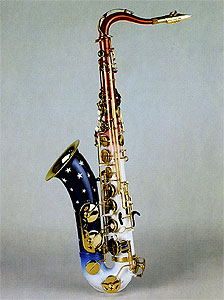Saxophone Sales Swell Since Election
 The "Presidential" model tenor saxophone. One of the 150 limited-edition brass saxes will be presented to President Clinton.
The "Presidential" model tenor saxophone. One of the 150 limited-edition brass saxes will be presented to President Clinton.There's one segment of the economy the President has already boosted without added stimulus: sales of saxophones, which are made mostly of brass and copper. Peter J. LaPlaca, president of Barrington Music Group (Michigan), reports that his factory's order backlog for saxophones has swelled since the election to five-months' production.
LaPlaca has been so encouraged by the growing demand for saxophones that he's introduced a limited-edition "Presidential" model. The 150 tenor saxophones are colored red, white and blue in an eight-step process. One will be presented to the President at a White House ceremony and then exhibited at the museum of musical instruments at the University of South Dakota in Vermillion. For those interested in acquiring one of the remaining 149, the cost is $3,000 apiece.
Barrington Music produces between 1,500 and 2,000 soprano, alto, tenor and baritone saxophones each year. The instruments, which the company has been creating since 1987 under the "L.A. Sax" brand, are made from brass tubing, forgings and stampings. To achieve certain musical effects, some key parts are plated with copper, silver or gold. The instruments are available in a variety of colors plus Prism Swirl ™. Among the famed users are: Art Porter, Warren Hill, Richard Elliot and Horace Alexander Young.
Some 27,000 saxophones are produced in the United States each year About 80 percent of these are bought by amateurs. All are made of brass. There is a limited production of saxophones made entirely of copper in Germany. They cost more than twice as much as saxophones made of brass.
LaPlaca said that there are about 300,000 professional saxophone players in the world and "millions of amateurs like the President." The saxophone was invented by Adolph Sax, a Belgium instrument maker, in 1840. He made them of brass, according to Joseph Peknik, a curator of musical instruments at the Metropolitan Museum of Art in New York, where some of Adolph Sax' instruments are on display.
Copper alloys are used in the manufacture of many other musical instruments. Most start with strip, but there's also a lot of tubing used, according to Ken Harrington of Small Tube Products, Altoona, Pennsylvania.Barrington Music Products: 888/943-1452
Small Tube Products: 814/695-4491
Also in this Issue:
- McDonald's Chooses Environmentally Friendly Copper
- Frank Lloyd Wright Gas Station
- Copper Sprinklers Rise to Meet Phoenix's Need
- Holy Toledo! Copper Graces both Old and New
- Copper Critical in Making of Pasta
- Saxophone Sales Swell Since Election
- "Classic" Copper for Weathervanes
